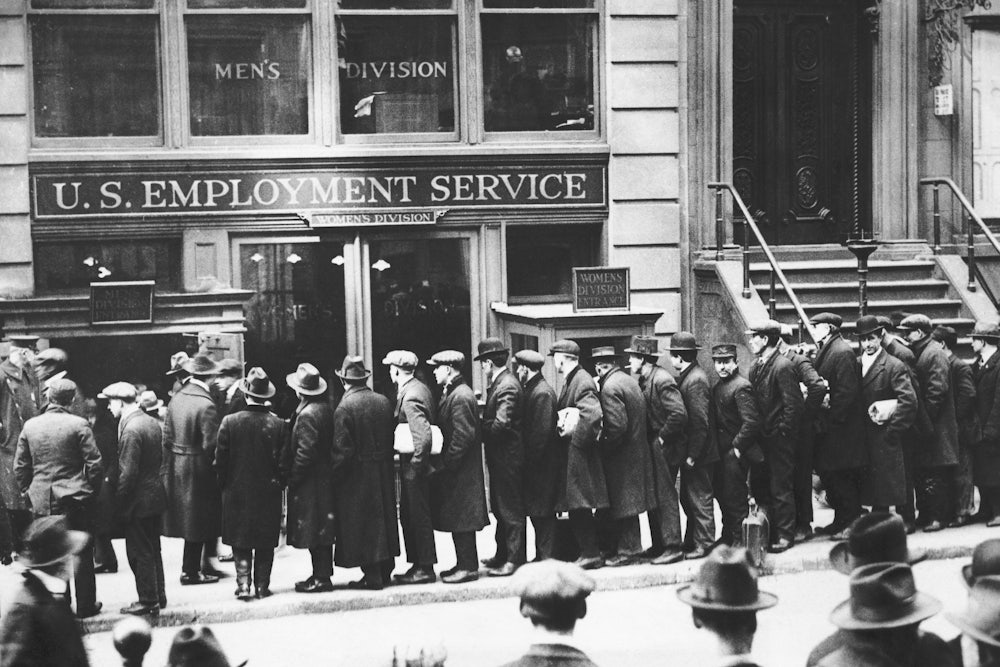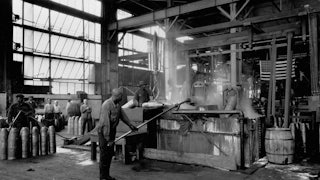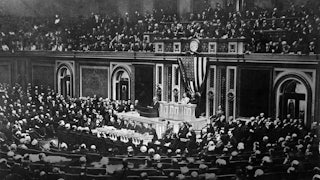By “buffer employment” is meant employment which absorbs the shock and jar of bad times, employment which quietly takes on men at a time when otherwise they would be tramping the streets looking for jobs and releases them as soon as they are able to find other work at better wages. It is a method devised to lessen unemployment. The greater the impending unemployment the greater the necessity for a well planned system of buffer jobs.
Just how much unemployment we may expect in the United States will depend upon what wisdom we show at the last hour. The armistice came upon us suddenly like a chill after a great heat. We were violently straining our resources and expanding our energies when in an instant peace came.
Today we are forced to demobilize the men in the camps. It would be dangerous not to demobilize them now that the exalted mood has passed and the men have no hope of going to France. We shall either demobilize or demoralize our soldiers. Simultaneously contracts for war supplies are being cancelled and must be cancelled. Not to cancel them means uselessly to waste capital, credit, transportation and raw materials which, sooner or later, must be used to re-employ men in non-war industries. We should cancel these contracts gradually and scientifically, with a maximum of warning to discharged men, and with a plan for placing these discharged men in other industries, at the same time insuring them against privation and loss. We may cancel these contracts and make the transition well or clumsily. If we do it well there will be some unemployment; if we do it clumsily there will be a great deal.
Seasonably the war comes to its end at a most unpropitious time. Had the war ended in the month of April, as did our Civil War, millions of soldiers and war workers might have been released for the spring planting and Europe would not have been forced to make the transition from a war famine to a peace famine. The whole disbandment of the army would have been easier. Spring and summer are the seasons of maximum employment, winter is the season of minimum employment. In winter there is little building, less farm work and almost no labor on the public roads. To an extent industry hibernates. Between today and April 1st 1919, we are threatened with an unemployment crisis, great or small, but likely to be more than had the fighting ceased a few months later.
The impending unemployment will be due in the main to two causes, maladjustment and the inevitable slowness of transition. If thirty million jobs were offered to thirty million qualified workers there would still be unemployment because the could not always find the man or the man the jobs and further because some localities and some trades would show an excess of demand for labor and others an excess of supply. Our chief difficulty, however, will arise from a temporary shortage of jobs. We are faced with the problem of placing an increased number of wage-earners in a diminished industry. We have conscripted new millions of industrial workers, men, women, men of independent means, the semi-employed, the semi-employable.
In certain industries and operations requiring a moderate degree of skill we have enormously expanded the number of men and women capable of holding jobs. We have simultaneously reduced the number of these jobs. It will take some time to go back to our old organization. If you convert a typewriter factory into an establishment for making high explosive shells you cannot immediately resume the manufacture of typewriters. Nor are you sure of your market.
Many Americans want typewriters as they want houses, steel rails, copper wire, cheese cloth and chemicals, but it does not follow that they want them at present prices or that they can afford to buy at those prices. A man will hesitate to build a new house for ten thousand dollars if he is reasonably certain that by waiting a year he can build a better house for eight thousand. Consumption goods, food, clothing, shoes, etc., must be bought whatever the price, but production goods, factories, railroads, machinery, are less likely to be bought on a falling market. We all want many things that we shall not offer to buy immediately. Economic demand is not the same thing as desire; it is desire plus a willingness and an ability to pay a certain price.
Such employment as befalls us, whether it be large or small, means more depression, a lessening of the power to buy, a lessening of the demand for goods and therefore for labor, and, as a consequence, more unemployment. After a while the whole economic system readjusts Itself. A new demand arises, the prospect of profits becomes greater, industrial pessimism gives way to optimism and the whole vicious circle, unemployment, non-consumption, unemployment, is broken. Perhaps the now threatened depression will be shorter than usual and American industry within six or twelve months will launch out into new activity. In the meanwhile, however, men hunger, worry, suffer, go to pieces. The moral fatalities alone are in-numerable.
Serious men have carefully studied and analyzed these depressions and their accompanying unemployment and have come to the conclusion that they can be foretold and, to an extent, prevented or minimized. Professor Wesley Mitchell, among others, has conclusively demonstrated that there are cycles of business activity and Inactivity, a rhythm resembling the loose, irregular rhythm of prose rather than the more rigid and formal rhythm of poetry. The problem, as Professor Mitchell sees it, is to stabilize industry, to establish a more consistent and uniform tempo, to draw on the good years to eke out the bad. The principle is as old as Pharaoh. Equalize demand; use your fat cells in periods of sickness; have the lean kine eat up the fat kine; let industrial society maintain an equal temperature instead of alternating between chills and fever.
The whole situation is absurd enough to justify any number of metaphors. What would a rational Martian think as he looked at our stupid oscillation between periods of corpulency and unnatural attenuation? Why do we industrially glut ourselves after we are already overfed and then resign ourselves to a period of starvation? In such matters we have the foresight of a boa constrictor without his excuse. For he has no control over his food supply, whereas we can control both food and work. At least we could if we thought and acted as a nation instead of a million sightless autonomous units.
The obvious thing to do is to prepare in prosperity for adversity. It was this proposal which Mr. William Hard eloquently advocated some years ago in a brilliant magazine article entitled Big Jobs for Bad Times. Mr. Hard proposed what had often been suggested before that in good times the federal, state and municipal governments elaborate plans and vote money for large public works to be begun at the first sign of a depression, Instead of building roads, aqueducts, arsenals and docks, when labor and capital are in excessive demand, build them when the demand for labor and capital is weak.
A million people read this article; a million people shook a million heads and gravely said, how true! A thousand of the million said, Let’s do something. A hundred of the thousand tried to do something and then got side-tracked, ran for Congress, went into the army or became adepts at bridge. I know of only one man (though I may be unjust to others) who kept on thinking and working on the subject and who Is still thinking and working on it.
The name of this tenacious man is Otto Mallery, of Philadelphia. Partly at his instance the State of Pennsylvania In 1917 passed an act creating an Emergency Public Works Fund and established an Emergency Public Works Commission. The legislature voted a small appropriation to serve as a nucleus for a larger sum, to be devoted to public works in bad times, and by a recent amendment to the state constitution the legislature was empowered to borrow fifty million dollars for the construction of roads. As a consequence Pennsylvania is now in a position to undertake large enterprises and thus lessen unemployment and ease the transition from a war to a peace basis of industry.
Today the War Labor Policies Board of the United States Department of Labor, again at the suggestion of Mr. Mallery to whom the work has been assigned, is urging the various states and cities to adopt the Pennsylvania system. Bills similar to the Pennsylvania law are being prepared for introduction Into the legislatures of several states and special appropriations and bond Issues are being sought in states and cities. The field is extensive, The average expenditure In the United States for public works is estimated at not less than six hundred million dollars a year, and a very large part of this work, which would normally have been done in 1917 and 1918, has been postponed owing demand, build them when the demand for labor and capital is weak. to the lack of raw material, the absence of labor and the scarcity of capital.
“It is a safe estimate,” writes Mr. Mallery, “that the amount of Public Works deferred during war period of 1917 and 1918 plus the ordinary new Public Works for 1919, would employ 2,400,000 workers for three months at average wages.”
Nor does this nearly exhaust the possibilities of useful public work that can be carried forward in the present emergency. The Department of the Interior is working upon a plan to create farms for returned soldiers. The Department could profitably employ half a million men to reclaim cut-over and swamp lands and develop new irrigation projects. Still other work presses. The Highway Transportation Committee of the Council of National Defense is about to ask for a federal appropriation of a hundred million dollars for highway construction. The harbors of New York, Philadelphia and other great ports require vast expenditures of labor; and flood prevention, on the lower Mississippi, the Miami and many other rivers, could profitably be planned and begun at this time. For all this an unhurrying speed is necessary. If the energy work is to achieve its purpose, two conditions must be met: the work must be planned and it must be carried out in time.
It must be planned because otherwise it will be ill-considered and wasteful. Too many projects will be begun and none finished. The projects will trench too sharply upon the supply of capital and credit which must be eventually devoted to other enterprises, public and private. All these evils, as well as a general inefficiency, can be avoided by carefully adjusting the plans of the federal, state and municipal governments to prevent excessive overlapping and to approximate a single policy. On the other hand planning and performance must be rapidly carried through. Otherwise we shall have commissions deliberating and dawdling until the evil has been done and the whole jug split. Our usual experience has been that each successive and loudly acclaimed Unemployment Commission gives advice to a future generation but no aid to its own. Is it too much to ask in this present emergency that we plan before we act and act in time?






